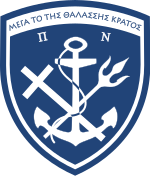Greek fleet
|
Hellenic Navy Πολεμικό Ναυτικό |
|
|---|---|

Hellenic Navy Seal
|
|
| Active | 1821 (de facto) 1828 (official) |
| Country |
|
| Role | National Defense |
| Size | over 30 000 Personnel
98 Warships including: 13 Frigates 11 Submarines 17 FAMCs 8 Gunboats 9 Tank-landing Ships 6 Patrol Boats Fleet Support & other Auxiliary Ships 21 Aircraft |
| Part of | Hellenic Armed Forces |
| Patron | St. Nicholas |
| Motto(s) |
Μέγα το της θαλάσσης κράτος - Méga to ti̱s thalássi̱s krátos "Great is he who holds (controls) the sea" |
| Colors | Blue, White & Gold |
| Engagements |
Greek war of independence Balkan wars World War I World War II Operation UNIFIL Operation Desert Storm Operation Desert Shield Operation Sharp Guard Operation Enduring Freedom Operation Active Endeavour Operation IFITOS Operation Atalanta Operation Ocean Shield 2011 military intervention in Libya Operation Aginor War on Terror |
| Website | Hellenic Navy |
| Commanders | |
| Chief of the Navy General Staff | Vice Admiral Nikolaos Tsounis |
| Chief of the Fleet Command | Vice Admiral Konstantinos Karageorgis |
| Notable commanders |
Andreas Miaoulis Konstantinos Kanaris Pavlos Kountouriotis |
| Insignia | |
| Identification symbol |
ΠΝ |
| Naval Ensign |  |
| Naval Jack & Pennant |
 |
The Hellenic Navy (HN; Greek: Πολεμικό Ναυτικό, Polemikó Naftikó, abbreviated ΠΝ) is the naval force of Greece, part of the Hellenic Armed Forces. The modern Greek navy has its roots in the naval forces of various Aegean Islands, which fought in the Greek War of Independence. During the periods of monarchy (1833–1924 and 1936–1973) it was known as the Royal Navy (Βασιλικόν Ναυτικόν, Vasilikón Naftikón, abbreviated ΒΝ).
The total displacement of all the navy's vessels is approximately 150,000 tons.
The motto of the Hellenic Navy is "Μέγα το της Θαλάσσης Κράτος" from Thucydides' account of Pericles' oration on the eve of the Peloponnesian War. This has been translated as "The rule of the sea is a great matter". The Hellenic Navy's emblem consists of an anchor in front of a crossed Christian cross and trident, with the cross symbolizing Greek Orthodoxy, and the trident symbolizing Poseidon, the god of the sea in Greek mythology. Pericles' words are written across the top of the emblem.
"The navy, as it represents a necessary weapon for Greece, should only be created for war and aim to victory."
The history of the Hellenic Navy begins with the birth of modern Greece, and due to the maritime nature of the country, it has always featured prominently in modern Greece's military history.
At the beginning of the Greek War of Independence, the naval forces of the Greeks consisted primarily of the merchant fleet of the Saronic islanders from Hydra, Spetsai and Poros and also the islanders of Psara and Samos. The fleet was of crucial importance to the success of the revolt. Its goal was to prevent as much as possible the Ottoman Navy from resupplying the isolated Ottoman garrisons and land reinforcements from the Ottoman Empire's Asian provinces.
...
Wikipedia
